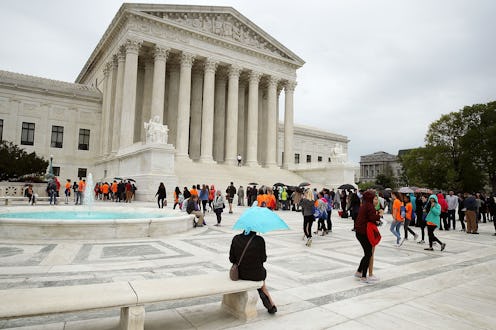News
The Supreme Court Will Rule On The Travel Ban

After two iterations of it were blocked by federal judges, the Supreme Court partially reinstated Trump's travel ban on six Muslim-majority countries on Monday. The decision allows the Trump administration to carry out its 90-day ban, though it will not be enforced against "foreign nationals who have a credible claim of a bona fide relationship with a person or entity in the United States." Those who already possess green cards and visas will be permitted to enter American soil. All other individuals from the six specified countries — Syria, Iran, Yemen, Libya, Somalia, and Sudan — will be subject to provisions in the executive order.
The court's decision does not make exceptions for refugees; those seeking to enter must also have a relationship with a U.S.-based person or entity. "But when it comes to refugees who lack any such connection to the United States," the court's recently-released opinion reads, "for the reasons we have set out, the balance tips in favor of the Government's compelling need to provide for the Nation's security."
It further states:
The interest in preserving national security is "an urgent objective of the highest order" [...] To prevent the Government from pursuing that objective by enforcing §2(c) against foreign nationals unconnected to the United States would appreciably injure its interests, without alleviating obvious hardship to anyone else.
Trump signed the first version of the executive order, which excluded travelers from seven rather than six countries, on Jan. 27. The mandate had immediate effects on travelers throughout the world, as it not only barred visitors from the targeted countries, but also those whole already possessed green cards, visas, and approval for refugee asylum. Reportedly, as many as 746 people faced obstacles, including deportation and being barred from boarding flights, at U.S. airports following its implementation. The order was blocked on Feb. 3, a decision upheld by the Ninth Circuit Court days later.
The president signed a second version on Mar. 6, this time excluding green card and visa holders from Iraq, as well as refugees who'd already been granted asylum, from the groups of people to whom U.S. entry would be denied. It further eliminated Iraq from the list of targeted countries. Federal Judge Derrick Watson of Hawaii issued a restraining order on the mandate on Mar. 15.
The American Civil Liberties Union promptly responded to the news by promising to battle the decision in court. A tweet published today on by the group's official account read:
We'll head back into court to fight the fundamentally unconstitutional Muslim ban this October.